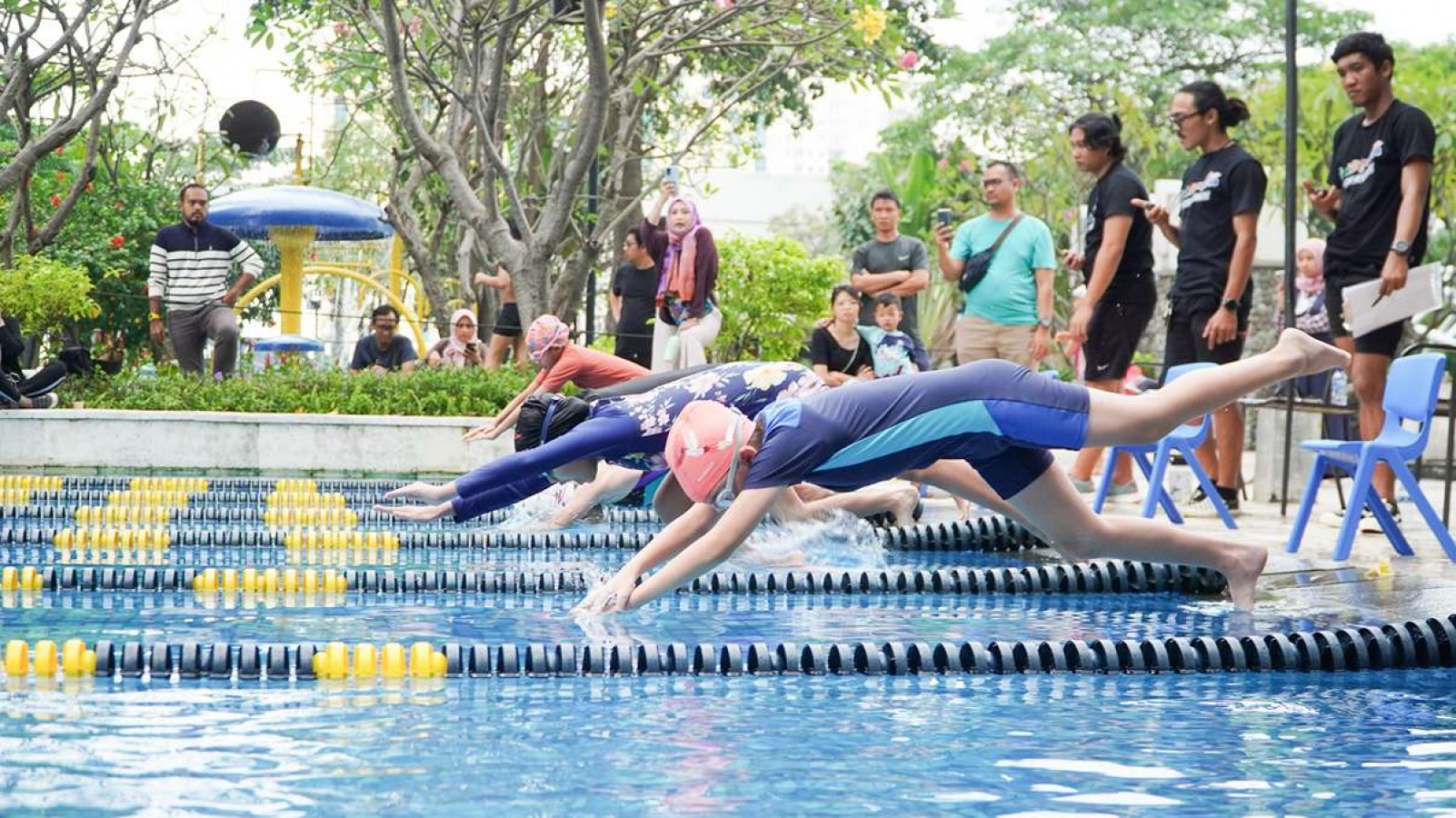How to Overcome Fear of Swimming: Overcoming Water Anxiety

Swimming is not just a recreational activity but also a life-saving skill. However, for many people, the fear of swimming can be a significant barrier.
If you're a young adult struggling with water anxiety or a parent helping a child overcome their fears, understanding and addressing these anxieties can lead to a safer and more enjoyable experience in the water.
This article will provide you with several effective tips on how to overcome fear of swimming. Let’s check it out!
Understanding Fear of Swimming
The fear of swimming is a common concern that can stem from various factors such as a traumatic experience, lack of exposure to water environments, or innate fear of drowning. Overcoming this fear is crucial not only for personal enjoyment but also for safety around water bodies.
Before diving into strategies to overcome swimming anxiety, it's essential to understand what causes this fear. A negative experience, such as a near-drowning incident or pressure from peers, can trigger a deep-seated fear.
Others may simply feel uncomfortable in water due to its unpredictability or their inability to control the environment.
Tips for Young Adults to Overcome Swimming Anxiety
If you're a young adult struggling with fear of swimming, here are some practical tips to help you build confidence and conquer your anxieties:
1. Start Slowly
Starting slowly means easing yourself into the water environment gradually, where you feel safe and in control. This could involve:
- Begin by standing in the shallow end of a pool or wading into a calm lake where you can touch the bottom.
- Spend time getting comfortable with the sensation of water around your legs and body.
2. Take Swimming Lessons
Enrolling in swimming lessons with a qualified instructor who specializes in teaching anxious swimmers can make a significant difference.
Look for adult beginner classes or private lessons where the instructor understands your fears and can guide you through basic skills like floating and breathing techniques.
They will teach at your pace, gradually increasing the depth and complexity of the exercises as your confidence grows.
3. Practice Relaxation Techniques
Learning relaxation techniques can help calm your mind and body when you feel anxious in the water. Try these methods:
- Practice deep breathing exercises before entering the water.
- Inhale deeply through your nose, hold for a few seconds, and exhale slowly through your mouth.
- Visualize yourself floating effortlessly or imagine a peaceful scene to distract from any nervous thoughts.
4. Set Realistic Goals
Setting achievable goals helps you track your progress and celebrate small victories along the way. Start with simple goals, such as learning to float on your back for 10 seconds or swimming a short distance without stopping. Each accomplishment boosts your confidence and motivates you to tackle the next challenge.
5. Use Floatation Devices
Floatation devices provide a sense of security while you build your swimming skills. Consider using a kickboard or swim noodles to assist while practicing strokes.
These tools support your body in the water, allowing you to focus on technique and gradually reduce reliance as you become more comfortable swimming without them.
6. Submerge Your Head
If you're hesitant about immersing your face in water, start by practicing near the pool wall. Position yourself in the shallow end next to the wall where you can stand comfortably.
Grip the wall with both hands and briefly dip your face into the water for a moment. Gradually extend the duration as you become more confident holding your breath.
7. Learn to Float on Your Back
Many people fear sinking underwater, and the most effective approach to overcome this is by mastering the art of floating. Become at ease with floating on your back and stomach.
Practice in shallow water close to the poolside, where you can stand or rest as necessary. Watch our tutorial video on floating for detailed guidance through each step!
8. Stay Persistent
Overcoming swimming anxiety takes time and consistent effort. Try committing to regular practice sessions, even if progress feels slow at first. Consistency helps desensitize your fear and build familiarity with water environments.
Celebrate your improvements, no matter how small, and trust that each session moves you closer to feeling more comfortable and confident in the water.
Advice for Parents to Help Children Overcome Swimming Anxiety
As a parent, you play a crucial role in helping your child overcome their fear of swimming. Here are some tips to support your child through this process:
1. Choose the Right Instructor
First advice for parents is to properly find the right swim classes for their children. It might sound simple but it requires lots of research.
Selecting a qualified swimming instructor who has experience working with anxious children is crucial. Look for instructors who are patient, understanding, and skilled in teaching fearful swimmers.
They should create a supportive environment where your child feels safe to learn at their own pace. Ask for recommendations from friends, check online reviews, or visit local swim schools to observe classes before making a decision.
2. Create a Positive Environment
Encouraging your child in a positive and supportive manner helps build their confidence. Here’s how you can foster a nurturing atmosphere:
- Praise your child for their efforts and progress, no matter how small.
- Avoid comparing them to others or using negative reinforcement.
- Celebrate achievements such as entering the water willingly, blowing bubbles, or floating with assistance.
- Make swimming lessons a fun experience by incorporating games and activities that promote water familiarity and confidence.
3. Build Trust
Building trust between your child and their swimming instructor is essential for overcoming anxiety. Introduce your child to the instructor before starting lessons. Let them observe a class or have a brief conversation to become familiar with each other.
Explain to your child that their instructor is there to help them learn and have fun in the water safely. Encourage open communication between your child and the instructor so that any concerns or fears can be addressed promptly and effectively.
4. Gradual Exposure
Introducing your child to water gradually through play and exploration helps them feel more comfortable. Start by playing with water toys in a shallow kiddie pool or bathtub at home.
As your child becomes more at ease, visit a local pool with a shallow, warm water area designed for children. Allow them to splash, wade, and gradually immerse themselves in deeper sections as they feel ready. Avoid rushing or forcing them into situations that may overwhelm their comfort level.
5. Use Visual Aids
Visual aids such as books, videos, or stories about swimming can demystify the process and make it more approachable for your child. Read books together about friendly characters learning to swim or watch child-friendly videos that depict swimming lessons in a positive light.
These resources can spark conversations about what to expect during swimming lessons and alleviate any fears or uncertainties your child may have.
6. Stay Calm and Patient
Modeling calm behavior around water, even if you have your own anxieties, sets a positive example for your child. If your child senses your anxiety or apprehension, they may mirror these feelings.
Remain composed and supportive during swimming lessons, offering reassurance and encouragement. Avoid showing frustration or impatience if progress seems slow. Your calm behavior will help create a relaxed atmosphere conducive to learning and building confidence.
7. Avoid Forceful Techniques
Respect your child’s feelings and avoid using forceful techniques that may increase their anxiety. Never push or coerce your child into the water or shame them for feeling fearful. Instead, gently encourage them to participate by offering choices and positive reinforcement.
If your child expresses reluctance, acknowledge their feelings and suggest trying again later or exploring different water activities together. Patience and understanding will help your child develop a positive association with swimming over time.
Need Help?
If your child needs help overcoming their fear of swimming, consider enrolling them in the swimming program at Rockstar Academy. Our Swimming Program offers a range of classes, we ensure that every swimmer can find a comfortable starting point.
Participants will learn to build a strong foundation for lifelong confidence in the water. Additionally, our students have the opportunity to compete in events such as the Elite Championships and RockOlympics, which provide invaluable learning experiences and the chance to realize their true swimming potential.
To experience our program firsthand, sign up for a free trial class and take the first step toward a lifelong love of swimming!
FAQ
Is it common to fear swimming?
Yes, it's quite common. Many people, both children and adults, experience fear of swimming due to various reasons.
How long does it take to overcome swimming anxiety?
The timeline varies for each individual. With consistent practice and support, many people see improvement over several weeks or months.
What if my child refuses to participate in swimming lessons?
Respect your child's feelings while gently encouraging exposure to water activities. Consider finding alternative approaches like family swim sessions or water play.



